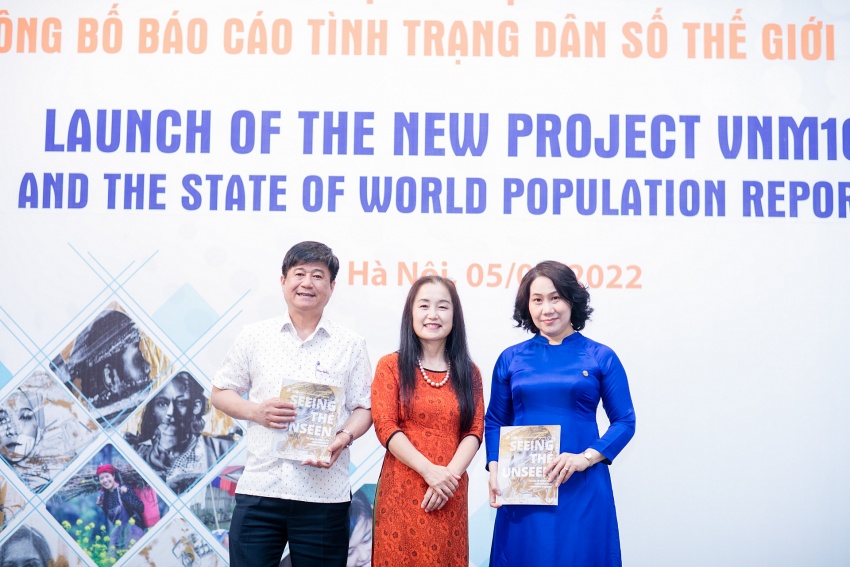$1.9 million population data project launched
 |
| GSO director general Nguyen Thi Huong and UNFPA representative Naomi Kitahara releasing the report |
With a total budget of $1.9 million, the project will be carried out for five years, applying technologies and new communication platforms to collect and analyse data.
Vietnam is in the midst of rapid transformation and socioeconomic growth. The country has been implementing strategies and plans to achieve its Sustainable Development Goals (SDG) by 2030. To support this, reliable statistics are fundamental to formulate, monitor, and assess the country’s progress in achieving its socioeconomic and SDG targets.
The 2030 Agenda stresses the importance of having high-quality population data. The commitment to leaving no one behind means that everyone must be counted, so everyone can be reached. Consistent and comparable data is a crucial element in making this a reality.
Nguyen Thi Huong, GSO director-general said that during 45 years of collaboration between Vietnam and UNFPA, the capacity of the GSO has been improved significantly.
"We will utilise the resources of the project for further development to provide data of the highest quality as soon as possible, thus contributing to policymaking and socioeconomic development," she added.
Naomi Kitahara, UNFPA representative in Vietnam said, “We are now entering into the tenth new country programme and GSO is one of the most important partners for UNFPA Vietnam. As we always say, countries with quality data are the ones that achieve the most impressive growth. Better Data, Better Lives.”
The project focuses on enhancing the capacity for collecting, analysing, and populating data. It will look into population and health, reproductive health, data management and use, and provide evidence on investment performance to improve the knowledge and skills of policymakers.
The report on the State of the World Population 2022 – Seeing the Unseen: The case for action in the neglected crisis of unintended pregnancy – was also released yesterday. The report highlights the seriousness of unintended pregnancies and their harmful consequences on sustainable development.
Globally, nearly a quarter of women are unable to make decisions about their own health care, and nearly 10 per cent are unable to make decisions about contraception.
For the women affected, the most life-altering reproductive choice – whether or not to become pregnant – is no choice at all. No country is spared as unintended pregnancies take place everywhere, highlighted the report.
The SDG survey conducted by Vietnam’s General Statistic Office in 2021, in collaboration with UNFPA and UNICEF, showed that only 72 per cent of married women are satisfied with modern contraceptives, and this percentage drops even further to 50 per cent for unmarried women. The problem seems to be acute among young people, whose unmet need for family planning is estimated to be four times higher than for married women.
Kitahara said, "Today and every day, we are calling on policymakers and community leaders to prioritise women’s and girls’ rights and to expand their choices. These include universal access to safe and effective contraceptives and making sure that every young person – including boys – is fully aware of the risks of unintended pregnancies and means of avoiding them. We need to listen to the voices of women, better understand their needs, and echo their calls for equality in every sphere."
"The 2030 SDGs call for ending the unmet need for contraception, achieving gender equality, and advancing bodily autonomy. We must redouble our commitment to achieve these goals and we must add the prevention of unintended pregnancies to our priorities," she added.
What the stars mean:
★ Poor ★ ★ Promising ★★★ Good ★★★★ Very good ★★★★★ Exceptional
Related Contents
Latest News
More News
- Congratulations from VFF Central Committee's int’l partners to 14th National Party Congress (January 25, 2026 | 09:46)
- List of newly-elected members of 14th Political Bureau announced (January 23, 2026 | 16:27)
- 14th Party Central Committee unanimously elects To Lam as General Secretary (January 23, 2026 | 16:22)
- List of members of 14th Party Central Committee announced (January 23, 2026 | 09:12)
- Highlights of fourth working day of 14th National Party Congress (January 23, 2026 | 09:06)
- Press provides timely, accurate coverage of 14th National Party Congress (January 22, 2026 | 09:49)
- Press release on second working day of 14th National Party Congress (January 22, 2026 | 09:19)
- Minister sets out key directions to promote intrinsic strength of Vietnamese culture (January 22, 2026 | 09:16)
- 14th National Party Congress: Renewed momentum for OVs to contribute to homeland (January 21, 2026 | 09:49)
- Party Congress building momentum for a new era of national growth (January 20, 2026 | 15:00)

 Tag:
Tag:
























 Mobile Version
Mobile Version